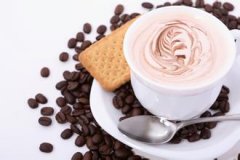Kenya Kam Chu Valley fine coffee beans with green tea sweet fragrance

About 55 - 60% of Kenya's coffee production (40 - 45% of the plantations) is managed by numerous small operators. Seeing that coffee was absolutely profitable, these small operators increased the need for agronomy and the development of high-quality coffee trees, thus greatly promoting the development of coffee in Kenya.
To ensure that only ripe coffee cherries are picked, people have to make about seven rounds through the woods. After harvesting coffee, they send the beans to a co-operative washing station, which sends the washed, dried coffee to the co-op in the form of "parchment coffee beans"(coffee beans coated with an endocarp)("parchment coffee" is the final state of coffee beans before peeling).
The Kenyan government takes the coffee industry extremely seriously, and it is illegal to cut down or destroy coffee trees here. Kenya's coffee buyers are world-class buyers of premium coffee, and no country grows, produces and sells coffee as consistently as Kenya. All coffee beans are first purchased by the Kenya Coffee Board, where they are appraised, graded and then sold at weekly auctions without grading. The best coffee grade is bean berry coffee (PB), followed by AA++, AA+, AA, AB, etc., in that order. Fine coffee is shiny, delicious and slightly aromatic. Kenyan coffee has become even more famous thanks to the Hollywood movie Out of Africa. Meryl Streep plays Karen, a writer and coffee plantation owner. Many people probably remember Karen's yellow and white linen dress, breathtaking views and magnificent sunsets in the film, and even more memorable is Karen's dream of owning a coffee plantation in Africa
Kenya Coffee Bean Kenya takes the coffee industry extremely seriously and it is illegal to cut down or ring coffee trees here. Kenya's coffee buyers are world-class buyers of premium coffee, and no country grows, produces and sells coffee as consistently as Kenya. All coffee beans are first acquired by the Coffee Board of Kenya (CBK), where they are appraised, graded and then sold at weekly auctions, where they are no longer graded. The Kenya Coffee Board acts only as an agent, collecting coffee samples and distributing them to buyers so that they can determine price and quality. Nairobi auctions are held for private exporters and the Kenya Coffee Board pays growers below-market prices. The best coffee grade is bean berry coffee (PB), followed by AA++, AA+, AA, AB, etc., in that order. Fine coffee is shiny, delicious and slightly aromatic. The auction is also organized to meet the needs of the distributor. These auctions usually sell small quantities (3-6 tons each), with samples bearing the grower's logo for buyers to appreciate. After auction, exporters pack according to different flavors, different qualities and quantities required by blenders. This provides a great deal of flexibility for the deployer. Quality-conscious germans and nordics are long-term buyers of kenyan coffee.
On an international scale, the growth in Kenyan coffee production has been remarkable, with exports rising from 800,000 bags in 1969- 1970 to 2 million bags in 1985-1986. Production is now stable at 1.6 million bags, averaging about 650 kg per hectare. The average price of coffee in Kenya has been rising since before the recent spike. 1993--1994 Prices are 50% higher in 2010 than they were 12 months ago. Price increases are mainly the result of increased demand.
Some buyers, especially Japanese ones, have complained about Kenya's coffee system. Some traders say the quality of coffee in the country has declined, pointing out that buying directly from farmers may be one way to improve quality. However, kenya's detailed regulations and procedures are a model for all coffee-producing countries because kenya coffee comes mostly from small coffee farmers, grows in a variety of environments, and experiences different climates and rainfall each year, bringing distinctive and unique personalities. Take AAPlus grade "KenyaAA+Samburu" as an example. Samburu of 2001 has strong dark plum fragrance, low acidity and strong taste. Samburu newly harvested in winter of 2002 presents completely different flavor. Mulberry berry and green plum, accompanied by a little spicy flavor. After drinking, it has sweet fragrance of green tea. The acidity is slightly higher than that of the previous year, and the taste is still strong. The usual Kenyan taste is not strong, but it has a fruity bright flavor, some with spices, some with red wine Kenya coffee-flavor Kenya coffee Kenya coffee
Aromatic, rich, fruity, rich and perfect on the palate. Kenya coffee has a wonderful fruity flavor, with a blackberry and grapefruit flavor, is a favorite of many coffee lovers. This coffee has an excellent medium purity, crisp and refreshing taste. Fresh flavor and best for iced coffee in summer. When tasting this coffee, if it is accompanied by fruit with acidity such as grapefruit, it will definitely give me the best coffee experience. "Less coffee, more fruit tea" is a common feeling many people have about this light-roasted Kenyan coffee.
Kenya Coffee-Flavor Kenya Coffee Kenya Coffee
Aromatic, rich, fruity, rich and perfect on the palate. Kenya coffee has a wonderful fruity flavor, with a blackberry and grapefruit flavor, is a favorite of many coffee lovers. This coffee has an excellent medium purity, crisp and refreshing taste. Fresh flavor and best for iced coffee in summer. When tasting this coffee, if it is accompanied by fruit with acidity such as grapefruit, it will definitely give me the best coffee experience. "Less coffee, more fruit tea" is the common feeling many people have about this light roasted Kenyan coffee.
In addition to the obvious and fascinating fruit acidity, Kenya coffee is mostly grown by small coffee farmers in a variety of different environments, with different climates and rainfall each year, bringing a variety of distinct and unique personalities. Take the AAPlus grade "KenyaAA+Samburu" as an example. Samburu from 2001 has a strong aroma of dark plum, which is not high in acidity and has a strong taste. Samburu newly harvested in winter of 2002 presents a completely different flavor. Mulberry berry and green plum, accompanied by a little spicy flavor. After drinking, it has a sweet aroma of green tea. The acidity is slightly higher than that of the previous year, and the taste is still strong. The typical Kenyan coffee is not dense, but it has a fruity, bright flavor, some spicy, some red wine. Kenyan coffee is mostly grown at an altitude of 1500-2100 meters and harvested twice a year. Kenya's industrious people love coffee like lovers in love.
Important Notice :
前街咖啡 FrontStreet Coffee has moved to new addredd:
FrontStreet Coffee Address: 315,Donghua East Road,GuangZhou
Tel:020 38364473
- Prev

A brief introduction to the Origin, Development, History and Culture of the Fine Coffee beans in Jinchu Valley, Kenya
The buyers of Kenyan coffee are world-class high-quality coffee buyers, and no other country in Kenya's Jinchu Valley can grow, produce and sell coffee as continuously as Kenya. All the coffee beans are first purchased by the Kenya Coffee Commission, where they are identified, graded, very fragrant and then sold at weekly auctions without grading at auction. The best grade of coffee is
- Next

Flavor Fresh Kenya Kam Chu Valley Fine Coffee Bean Planting Location Climate Elevation Profile
Some buyers, especially Japanese ones, have complained about Kenya's coffee system. Some traders say the quality of coffee in the country has declined, pointing out that buying directly from farmers may be one way to improve quality. But Kenya's detailed rules and procedures are a model for all coffee-producing countries
Related
- Detailed explanation of Jadeite planting Land in Panamanian Jadeite Manor introduction to the grading system of Jadeite competitive bidding, Red bid, Green bid and Rose Summer
- Story of Coffee planting in Brenka region of Costa Rica Stonehenge Manor anaerobic heavy honey treatment of flavor mouth
- What's on the barrel of Blue Mountain Coffee beans?
- Can American coffee also pull flowers? How to use hot American style to pull out a good-looking pattern?
- Can you make a cold extract with coffee beans? What is the right proportion for cold-extracted coffee formula?
- Indonesian PWN Gold Mandrine Coffee Origin Features Flavor How to Chong? Mandolin coffee is American.
- A brief introduction to the flavor characteristics of Brazilian yellow bourbon coffee beans
- What is the effect of different water quality on the flavor of cold-extracted coffee? What kind of water is best for brewing coffee?
- Why do you think of Rose Summer whenever you mention Panamanian coffee?
- Introduction to the characteristics of authentic blue mountain coffee bean producing areas? What is the CIB Coffee Authority in Jamaica?

